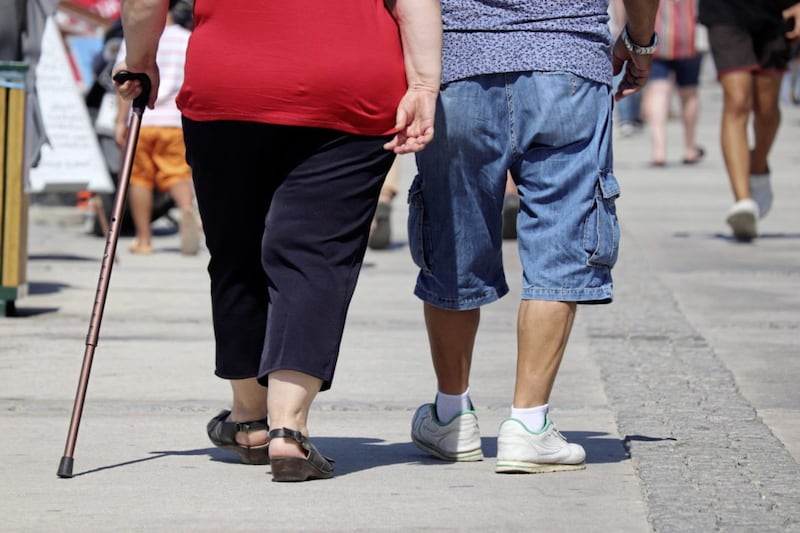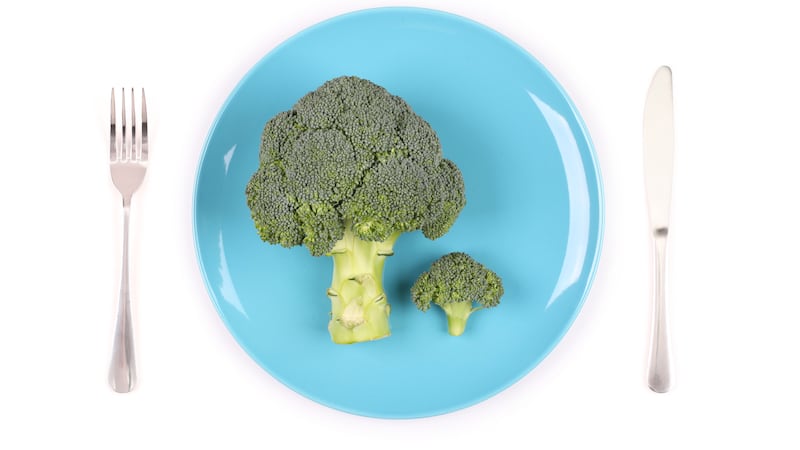A DRUG that can safely aid rapid weight loss and keep it off sounds too good to be true. Yet apparently it exists.
Saxenda (generic name, liraglutide) was originally developed as a drug for diabetes but has been shown to reduce body weight by, on average, 7.5 per cent in under nine months.
And in a trial led by Copenhagen University, Denmark, involving 195 obese adults, those given the drug (administered as a daily injection) lost 16 per cent of their body weight in a year when combined with regular exercise, according to research in the New England Journal of Medicine in May.
The drug works by mimicking a hormone that suppresses appetite.
Given that one third of the UK population is now 'obese' (it was 5 per cent in the 1970s), the drug looks like it might be a useful way to help tackle growing waistlines.
Yet under National Institute for Health and Care Excellence guidelines, Saxenda can be prescribed, with diet and exercise changes, only to those with a body mass index (BMI) of 35 or more (classed as 'extremely obese'), who have pre-diabetes and a cardiovascular complication such as raised blood pressure or raised cholesterol. Otherwise, it is available only on private prescription - at £260 a month.
Experts believe treatments such as Saxenda should be more widely available.
Among them is John Wass, a professor of endocrinology at Oxford University and a spokesman for Obesity Health Alliance, a coalition of organisations working to reduce obesity.
"The drug is very effective, safe and has minimal side-effects," he says.
"People can often lose more than 5 per cent of their body weight within three months."

Professor Wass believes the narrow criteria for its use is part of a bigger issue.
"The Royal College of Physicians has recognised that obesity is a disease, but the Department of Health and Public Health England haven't," he says.
"I think politicians are worried that it will cost too much and GPs will get overwhelmed with demand.
"But losing weight isn't as easy as just eating less and moving more. About 70 per cent of weight is determined by your genes, while socio-economic factors also play a role, as does the availability of cheap junk food.
"People need help to lose weight - and obesity drugs work, particularly alongside diet and exercise changes."
Saxenda is one of a range of weight-loss prescription drugs now available on the NHS and to buy privately from some pharmacies.
These include orlistat, which blocks fat absorption and has been shown to reduce weight by an average 3 per cent over a year, but only 355,000 prescription items of this drug were issued in 2019.
The lack of availability of such pills - and the lack of diet help generally - means people are turning to less regulated options.
The demand is huge, with the global diet supplements industry predicted to rise to £29 billion by 2024.
Overweight people are "buying everything under the sun out of desperation because the NHS system is not helping them", says Dr Abd Tahrani, an honorary consultant endocrinologist at University Hospitals Birmingham NHS Trust, who works with Novo Nordisk, the manufacturer of Saxenda.
Many of them turn to online diet supplements - promoted with vague claims - and occasionally bogus celebrity endorsements.
In May, comedian Dawn French noticed her image was being used on an advert claiming, falsely, that she had lost over six stone in five months using a raspberry ketone diet supplement, billed as a fat-burner.
On Twitter, French made it plain to her 500,000 followers that this was not the case.
This is just one example of the many herbal and food supplements touted as slimming pills on the internet - with many claims based on the flimsiest of evidence and backed up by little long-term safety data, says Gunter Kuhnle, a professor of nutrition and food science at Reading University.
Some supplements may even be toxic at high doses. In a case reported last year, in the Anatolian Journal of Cardiology, raspberry ketone supplements, a current popular choice, were thought to have induced cardiac vasospasm - sudden narrowing of the arteries - in one woman who took two tablets for the first time.
An earlier study, published in 2015 in the journal Regulatory Toxicology and Pharmacology, concluded the "toxic potential" of raspberry ketone needs to be clarified with further studies.
Another risk is that such food and herbal supplements can contain added drugs.
"People need to be aware of this, especially when buying online from websites," says Prof Kuhnle.
"Very little checking by authorities is done."
Dr Tahrani says people aren't only being tempted by herbal or food supplements.
"They will also buy drugs from unregulated online agencies - medications such as sibutramine, an appetite suppressant drug which was withdrawn in the UK in 2010 because of safety reasons, including an increased risk of heart attack and stroke.
"This is a very dangerous area - people are so desperate to lose weight, either because they've tried to get help within the NHS system and failed, or they feel the stigma of being overweight and don't seek medical help."
The most effective medical solution for people who are overweight is bariatric surgery - for example, a gastric bypass or gastric band. This type of surgery can help patients lose up to 60 per cent of their excess weight.
However, to qualify for bariatric surgery on the NHS you need to have a BMI of 40 or more, or a BMI of 35-40 and an obesity-related condition such as type 2 diabetes.
Only around 7,000 operations a year are performed on the NHS each year, despite estimates that 3.5 million people could qualify. To find out what the other options are, we asked experts for an update on the evidence for, and safety of, the latest medicines and supplements.
FOOD AND HERBAL SUPPLEMENTS
Some of the popular ingredients in weight-loss supplements include raspberry ketone (a compound that gives raspberries their distinctive aroma), apple cider vinegar, green tea extract, capsaicin (a component of chilli peppers) and white kidney beans.
These claim to work in two ways - blocking the absorption of fat or starch, or by speeding up metabolism, says Prof Kuhnle.
Yet many of them make claims based on laboratory experiments on animals, not humans, which isn't clear on the packaging or the website where a product is sold.
For example, some sites hold claims that raspberry ketone speeds up metabolism - but closer inspection of the research reveals this is based on studies on mice, which showed they promote weight loss, says Prof Kuhnle.
"The only study in humans I could find mentioning raspberry ketone was on a supplement with multiple ingredients, including capsaicin, caffeine and bitter orange," he says.
Prof Kuhnle is slightly more convinced by supplements with white kidney bean, which block the absorption of starch by inhibiting enzymes.
"These may have small effects, as the starch will pass out of the body undigested and also make you feel fuller for longer and reduce hunger," he says.

Green tea extract is a popular choice, and a study from Taiwan published in 2016 in the journal Clinical Nutrition found that women treated with a high dose (856mg) of the extract for 12 weeks had lost 2.4lb (1.1kg), which the authors said may be associated with a reduction in the hunger hormone ghrelin.
However, the study also showed an increase in liver enzymes - a sign that the liver is struggling.
"The worry with green tea extract is that if you use excessive amounts, it's toxic," says Prof Kuhnle.
"Anything above 800mg a day [equivalent to drinking around 1.2 litres, which most people would find difficult to consume] is toxic to the liver."
Apple cider vinegar supplements are also popular. A study published in the Journal of Functional Foods in 2018, based on 44 people, found dieters who followed a reduced-calorie diet who also consumed 30ml of apple cider vinegar a day lost 3lb more weight over 12 weeks than a control group of dieters.
"But there doesn't seem to be much clarity about the mechanism," says Prof Kuhnle.
"It might well be that the vinegar taste has an impact, and the acetic acid in the vinegar could also be used by intestinal cells in some way, but the data is rather weak."
A recent review of 121 studies of weight-loss supplements, the largest review in 10 years and involving more than 10,000 patients, concluded there was "insufficient evidence that herbal and dietary supplements produce clinically significant weight loss".
The study, which was published in two parts, in Diabetes, Obesity and Metabolism in 2020 and in the International Journal of Obesity in 2021, looked at trials of 60 different substances.
None had a clinically significant effect, defined as weight loss of 5.5lb (2.5kg).
"People are just wasting their money on these supplements: in terms of clinically significant results of weight loss, the evidence just isn't there," the study author, Erica Bessell, a PhD student from Sydney University, told us.
"Our main concern is that some claims made are misleading, and they are persuading people to buy them when there isn't the evidence to back them up."
There is also the more serious risk that some also contain drugs, a number of which are banned.

A United States study of food supplements published in 2018 in the journal JAMA Network Open, identified 776 'adulterated' supplements - 40 per cent of them for weight loss - sold between 2007 and 2016.
The most common ingredient added to supplements was sibutramine, the drug withdrawn from the UK market in 2010.
Another commonly added was the laxative phenolphthalein, a potential carcinogen which may also lead to gastric problems.
Prof Kuhnle says there is so little enforcement of the food supplement world that it has been described as a 'wild west'.
The market seems to fall between different regulatory authorities, while internet sites are hard to control.
Meanwhile, another supplement called 2,4-Dinitrophenol (DNP) is sold illegally on the internet, across social media and in gyms as a 'fat burner'. It contains a chemical used to make munitions in World War I and has caused 32 deaths in the UK since 2007.
In 2020, Bernard Rebelo from Gosport, Hants, was sentenced to seven years in prison for gross negligence manslaughter for supplying DNP to a 21-year-old student, Eloise Parry from Shrewsbury, Shropshire, who died after taking eight capsules. Rebelo sold the drug via two websites.
PRESCRIPTION DRUGS
Prescription drugs have proven weight-loss benefits backed up by large trials.
The drug orlistat, first introduced 10 years ago, stops the absorption of roughly one-third of fat intake.
However, research shows the drug achieves only modest weight loss - 3 per cent more than those who diet alone - and many patients stop taking it as it may cause fatty stools and diarrhoea.
Orlistat is available over-the-counter under the brand name Alli.
Pharmaceutical companies have been working on a new class of diet drugs, glucagon-like peptides (GLP-1) agonists. These were developed as diabetes drugs but were found to lead to weight loss, too.
They mimic the appetite hormone glucagon-like peptide (GLP) that controls hunger.
Saxenda is one of these and has been available privately in the UK since 2017.
Last year, LloydsPharmacy began selling it on private prescription (for about £260 a month) for people with a BMI of 27 or more and with certain health conditions.
Last October, Nice approved it for use on the NHS for those with a BMI of 35 (32.5 in certain ethnic groups), plus pre-diabetes and a risk factor for heart disease, such as raised blood pressure or cholesterol.
Also available in the UK is Myalept (generic name, metereleptin), a medicine developed to replace leptin, a hormone that tells the brain we are full.
In January, Nice approved it for people with the genetic disorder lipodystrophy, who lack leptin.
DIET DRUGS IN THE PIPELINE
There are new weight-loss drugs on the horizon including another effective GLP-1 agonist (like liraglutide) called Rybelsus (generic name, semaglutide).
This is already approved here as a diabetes drug in the form of a 1mg pill, and as a weekly injection (brand name Ozempic) to control blood sugar.
Last month, it was approved in the United States as a higher dose injection under the brand name Wegovy for weight loss. It is being assessed by the Medicines Healthcare Regulatory Agency here as a weight-loss treatment, with a decision expected in the autumn.
The latest research on semaglutide, published in the New England Journal of Medicine in February, found it could help some obese people lose 20 per cent or more of their body weight.
The average participant in the 68-week trial lost 15.3kg (nearly 3st); this was accompanied by reductions in risk factors for heart disease and type 2 diabetes, such as blood fat and blood sugar levels.
Rachel Batterham, a professor of obesity, diabetes and endocrinology at University College London, one of the principal authors on the paper which involved almost 2,000 trial participants in 16 countries said: "Three quarters of people who received semaglutide (at the 2.4mg weekly dose) lost more than 10 per cent of their body weight and more than one third lost more than 20 per cent.
"No other drug has come close to producing this level of weight loss. This really is a game-changer.
"For the first time, people can achieve through drugs what was only possible through weight-loss surgery."
However, it works only in around one third of people and possible side-effects include mild to moderate nausea and diarrhoea. Furthermore, the benefits stop when the patient stops taking it.
Another drug undergoing clinical trials is tirzepatide, a weekly injection which targets the GLP appetite control hormone and another hormone (called glucose dependent insulino-tropic polypeptide) that slows down emptying of the stomach and makes you feel fuller for longer. Studies found patients lost 12lb over 12 weeks.
Simon Capewell, a professor of public health at Liverpool University, adds a note of caution though.
"The drugs have a role, but that role should not be overstated," he says. "They are more effective if used as part of a comprehensive weight loss regimen with a patient... getting psychological support as well as advice about diet and exercise."
© Daily Mail








